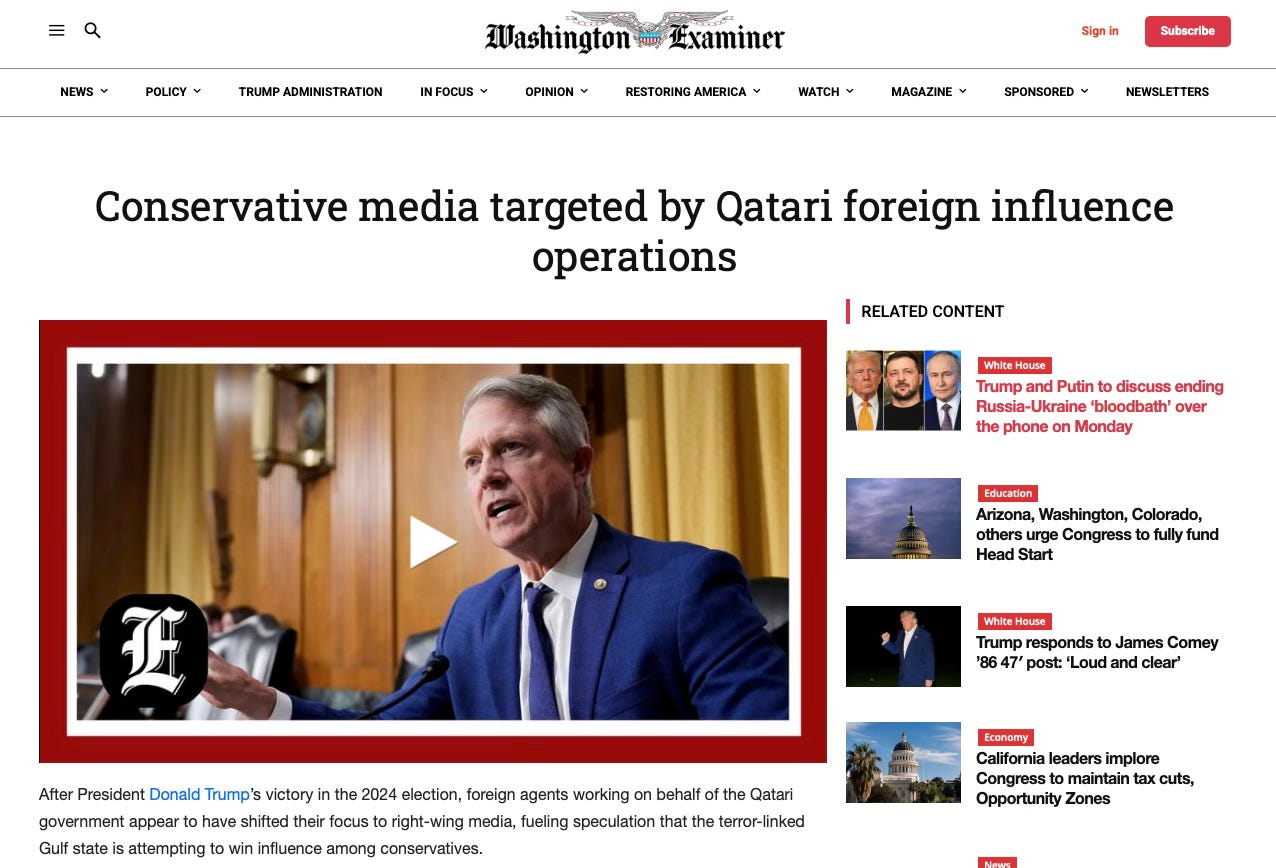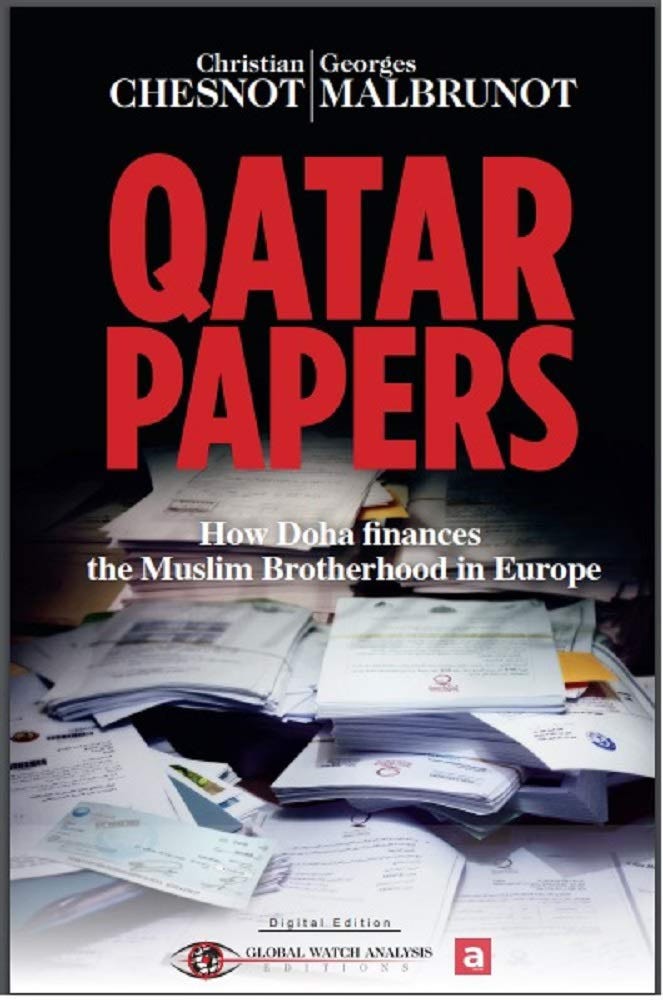Written By B.J. Dichter, Posted on May 18, 2025

After Donald Trump’s victory in the 2024 presidential election, Qatari foreign agents reoriented their media outreach strategy, focusing heavily on right-wing and conservative outlets in the U.S. Prior to the election, just 10% of Qatar’s communications targeted conservative media. That number jumped to over 50% following the Republican win. The shift appears to be a calculated attempt by Qatar, a nation long scrutinized for its ties to terrorist groups, to gain favour with the new administration and its allies, particularly amid growing Republican criticism over its connections to Hamas and Iran.

A notable example of this influence campaign was a high-profile, friendly interview between Tucker Carlson and Qatari Prime Minister Mohammed bin Abdulrahman Al Thani, which was facilitated by Lumen8 Advisors LLC, a firm paid $180,000 per month by the Qatari Embassy. Qatar also gifted a $400 million luxury jet to the U.S. Department of Defense, which is set to be transferred to Trump’s presidential library, sparking debate over foreign influence and ethics in Washington.
Qatari agents, working through firms like GRV Strategies, targeted major conservative outlets such as Fox News Digital, Just The News, the New York Post, the Daily Mail, and the Washington Examiner. In several cases, these outlets published pro-Qatar stories shortly after receiving pitches from Qatari agents, though it is not definitively proven that the agents directly influenced the content. GRV Strategies, led by a well-connected Republican operative, receives $80,000 a month from Qatar for media relations.
Additionally, the U.S. Department of Justice, under Attorney General Pam Bondi (a former Qatar lobbyist), announced a narrowing of foreign lobbying enforcement, making it easier for countries like Qatar to conduct unregistered lobbying activities in the U.S. This has raised concerns about the extent of foreign influence on the Trump administration and U.S. policy.
The 2019 book _The Qatar Papers_ by Christian Chesnot and Georges Malbrunot revealed Qatar’s extensive efforts to finance the Muslim Brotherhood and promote Islamist influence across Europe. Drawing on leaked documents, the book detailed how Qatar, primarily through the powerful Qatar Charity NGO, funded at least 140 projects-including mosques, schools, and Islamic centres-across multiple European countries. The book exposed secretive payments, including large monthly sums to controversial Islamist figures, and highlighted how Qatari money was used to build influence networks and promote Brotherhood-linked ideology.

The _Qatar Papers_ demonstrated that Qatar’s use of financial leverage to shape political and social outcomes is not new, but part of a broader, long-term strategy. The book also documented the lack of transparency and the willingness of some local officials to overlook foreign funding for electoral or practical reasons.
Both the recent Washington Examiner article and book The Qatar Papers; How Doha finances the Muslim Brotherhood in Europe by Christian Chesnot and Georges Malbrunot illustrate Qatar’s strategic use of financial resources and media influence to advance its interests abroad. While The Qatar Papers focused on Qatar’s covert funding of Islamist networks in Europe, the current article describes similar tactics being deployed in the U.S. this time targeting conservative media and political circles following Trump’s return to power. In both cases, Qatar leverages money, lobbying, and media manipulation to shape favourable narratives and build alliances, whether with European Islamists or American conservatives.
The continuity between the two contexts underscores Qatar’s adaptability in its influence operations: shifting targets and methods depending on the political landscape, but consistently seeking to expand its soft power and protect its interests on the global stage.
The article details a sophisticated Qatari influence campaign in the U.S., marked by targeted outreach to conservative media and substantial financial outlays to shape public perception and political alliances in the wake of Trump’s 2024 victory. This strategy echoes the patterns exposed in The Qatar Papers (2019), which documented Qatar’s covert funding of Islamist networks and influence operations across Europe.
Given this context, it is worth openly questioning whether the same financial networks and lobbying operations described potentially involving opaque payments and media manipulation might also be connected to the mass pro-Hamas protests across U.S. university campuses. These protests, which mobilized tens of thousands of students and faculty, were highly organized, widespread, and in some cases, linked to demands and rhetoric that align with Qatari foreign policy interests, particularly regarding Gaza and opposition to Israel.
While there is no direct public evidence tying Qatari money or lobbying firms to the financing or orchestration of these protests, the scale and coordination of the campus movement, combined with Qatar’s documented willingness to fund political activism abroad, raises legitimate questions. Could some of the same financial channels used for media influence and political lobbying also be supporting activism on the ground? Are there undisclosed financial ties between Qatari interests and protest organizers, or are these parallel but unrelated phenomena?
The timing and intensity of both the Qatari media campaign and the eruption of mass protests suggest at least the possibility of a broader, coordinated strategy to shape U.S. discourse and policy on the Middle East. As the revelations of _The Qatar Papers_ remind us, Qatar has a proven track record of using financial leverage to influence events far from its borders. In light of these patterns, further scrutiny of the funding sources and organizational structures behind the 2024 campus protests is warranted, and the potential for overlap with Qatari influence operations cannot be ruled out.
Author Honking For Freedom, Podcaster, Speaker, Trucker #FreedomConvoy Spokesperson. #Bitcoin http://HonkingForFreedom.com | http://BenjaminJDichter.com
Very well presented. Every quote was awesome and thanks for sharing the content. Keep sharing and keep motivating others.